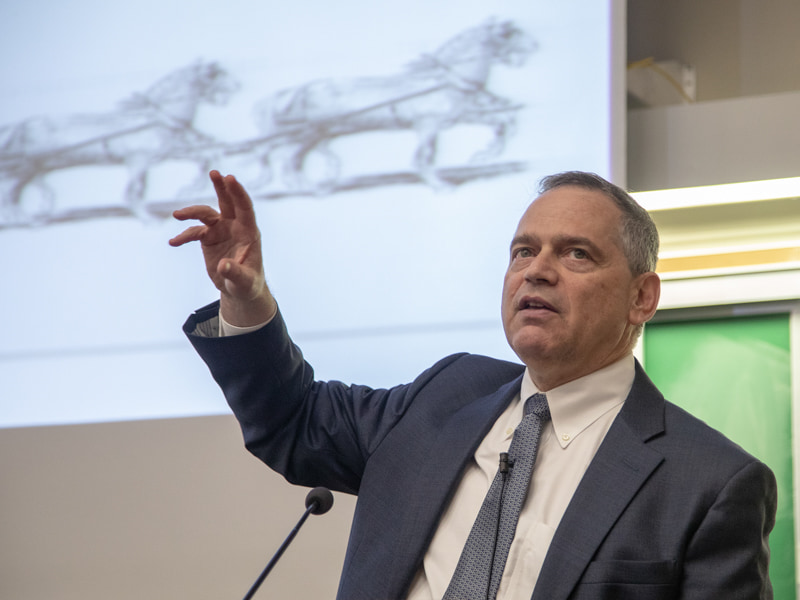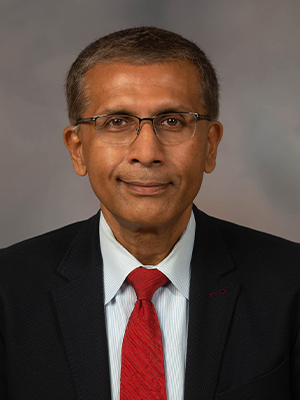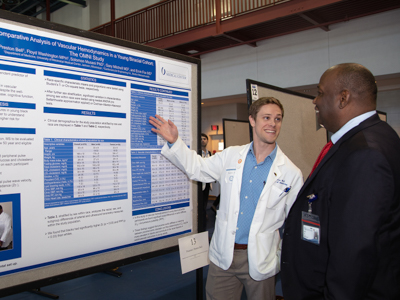DOM, Barksdale Lecturer: Data-driven medicine speeds progress

It takes years, if not decades, for a simple observation in a laboratory or clinic to develop into a fully-vetted medical advance. If you or a loved one is ill, you may not have that kind of time to wait for treatment. How can we speed up this process?
Dr. Harlan Krumholz proposed one possibility when he visited the University of Mississippi Medical Center April 16 to deliver the Thomas Barksdale Cardiovascular Memorial Lecture, “Learning at the Speed of Digital: The Next Step toward a Learning Health System.”
The lecture also served as the keynote for the Department of Medicine’s annual Research Day, where about 100 students, residents
Krumholz is the Harold H. Hines, Jr. Professor of Medicine and director of the Center for Outcomes Research and Evaluation at the Yale School of Medicine. Forbes magazine once called him “The Most Powerful Doctor You’ve Never Heard Of.” But Dr. Javed Butler, professor and chair of medicine at UMMC, has definitely heard of Krumholz, who worked with him at Yale.

“Krumholz was one of a handful of people in the early
“He was ahead of his time and helped shape this field,” Butler said.
In the
“We started to focus on how much more we can get out [of health care] by squeezing what we already know,” Krumholz said. “It’s about working smarter, being more accountable and putting the pieces together.”
Krumholz centered his talk around three concepts needed to improve care: knowledge, application
Between electronic health records, personal devices

“How do tech companies learn? With every purchase, search and mile driven, they get smarter,” Krumholz said. “Amazon doesn’t give its data to a team of academics and wait for publication. In health care, we sequester knowledge and it doesn’t join the collective wisdom.”
While clinical trials will remain an important part of the knowledge-generating process, the advent of big data, machine learning and precision medicine can help the field develop into an information science, Krumholz said.
“The essence of a
However, medicine requires a human element, even in the age of algorithms and tech-assisted decision support. General recommendations exist for when to start a patient on a treatment regimen, “but that may not be the right recommendation for the patients that live in your neighborhood, or are 85 years old, or live in a food desert,” Krumholz said.
Without considering these social determinants of health, physicians run the risk of “applying guidelines incompletely and not paying attention” to the needs of their patients, he said. When young physicians question why their patients don’t fill seemingly inexpensive prescriptions, Krumholz asks them to try to view the world through a different lens.
“When a patient can’t afford $30 a month for
Department of Medicine Research Day Poster Presentation Awardees:
First Place - Elliot Varney,
Second Place – Dr. Adebamike Oshunbade, postdoctoral fellow-cardiology
Honorable Mention – Dr. Jasmine Padgett, house officer-internal medicine
Honorable Mention – Dr. John Kolawole, house officer-internal medicine
Department of Medicine Research Excellence Awardees:
Fred Allison Research Excellence Award
Dr. Shou-Ching Tang
Associate Director, UMMC Cancer Institute
Clinical and Translational Research
Professor of Medicine and Pharmacology and Toxicology
Stanley Chapman Young Investigator Research Excellence Award
Dr. Donald “Trey” Clark III
Assistant Professor of Medicine, Division of Cardiology
Herbert G. Langford Research Mentor Excellence Award
Dr. Daniel Jones
Sanderson Chair in Obesity, Metabolic Diseases
Director, Clinical and Population Science, Mississippi Center for Obesity Research
Led by the Office of Research and Sponsored Programs, the Medical Student Research Program (MSRP) presentations are a separate competition but invited to participate in the Department of Medicine Research Day.
MSRP Oral Presentation Awardees:
First Place – Elliot Varney
Second Place –
Third Place – Caleb Martin
MSRP Poster Presentation Awardees:
First Place – Savannah Stockton
Second Place – John Yi
Third Place – Sara Kiparizoska
Third Place – Daniel McClung


